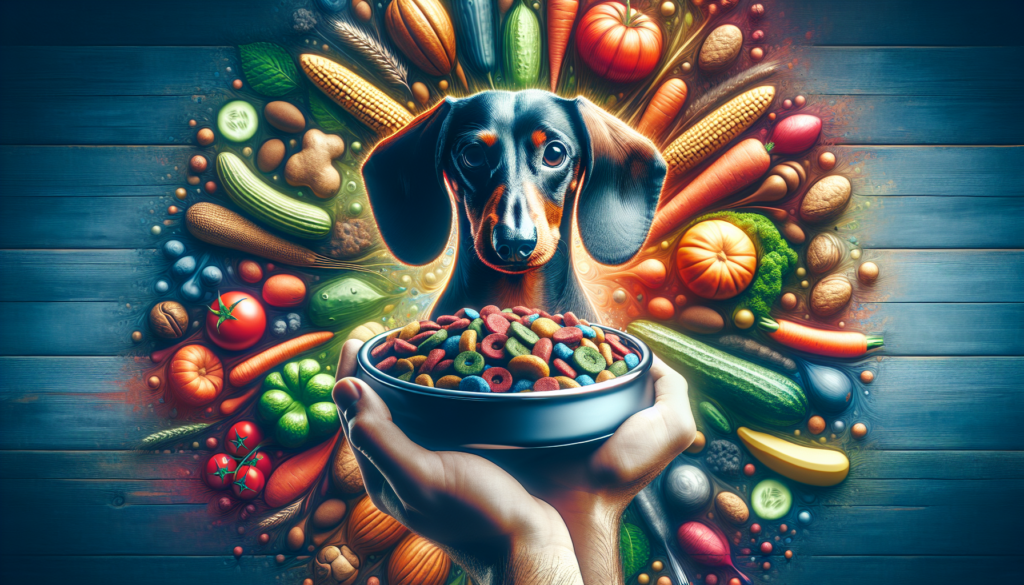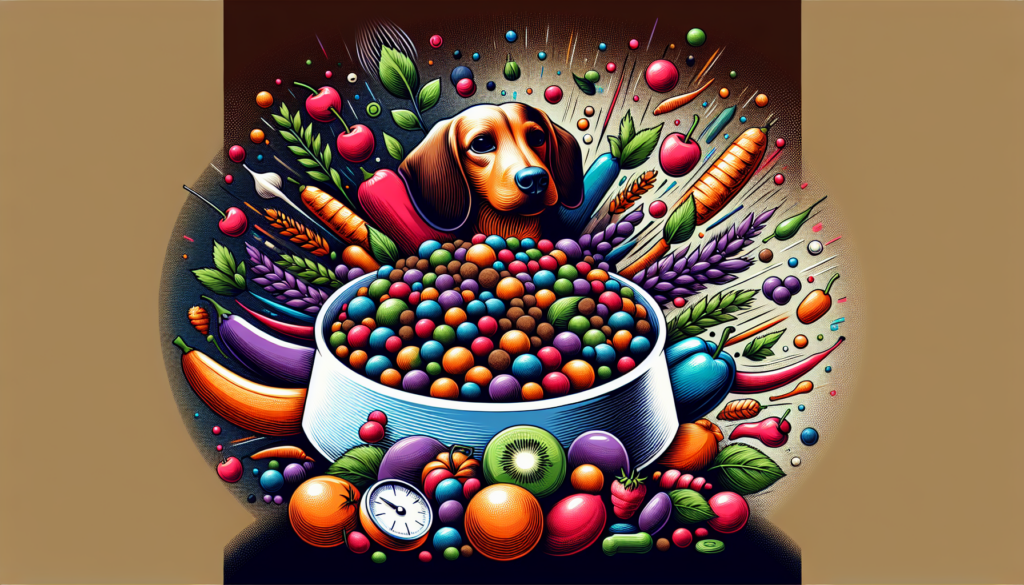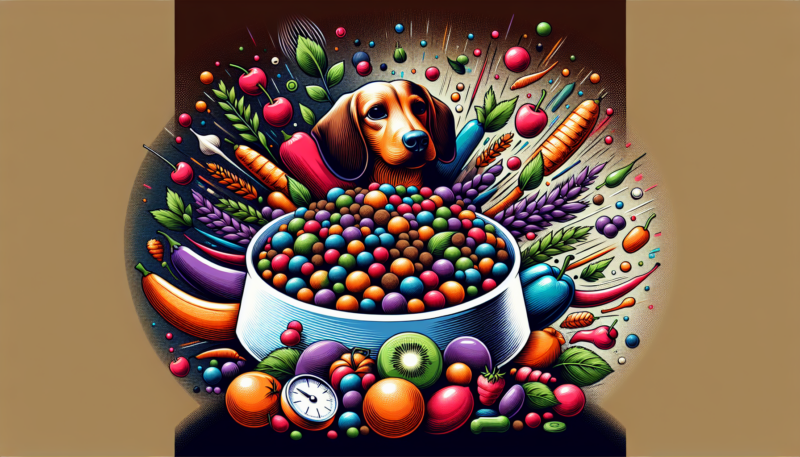Are you a proud owner of a dachshund? If so, you know that finding the best diet for your beloved furry friend can be a daunting task. With their unique body structure and predisposition to certain health issues, it’s crucial to provide them with the proper nutrition. In this article, you’ll discover valuable insights and expert recommendations on the best diet for dachshunds. Whether you’re just starting your journey with a new dachshund or looking to improve your current feeding routine, we’ve got you covered! Let’s dive into the world of dachshund nutrition and ensure your furry friend enjoys a healthy and happy life.
Understanding Dachshunds
Dachshunds are a popular breed known for their long bodies and short legs. They were originally bred in Germany to hunt badgers, which is where their name, Dachshund, comes from. These dogs have a playful and lively personality, making them great companions for individuals and families alike.
Overview of Dachshunds
Dachshunds come in three different sizes: standard, miniature, and toy. The standard size typically weighs between 16 and 32 pounds, while the miniature size weighs between 11 and 15 pounds, and the toy size weighs less than 11 pounds. Their unique body shape and elongated spine can make them prone to certain health issues, which we will explore later in this article.
Common Health Issues in Dachshunds
It’s important to be aware of the common health issues that Dachshunds may face in order to provide them with the best care. Some of the common health issues include intervertebral disc disease, obesity, dental problems, and allergies. By being proactive and taking appropriate measures, you can help promote your Dachshund’s overall health and well-being.
Importance of a Proper Diet
A proper diet plays a crucial role in maintaining and promoting the health of Dachshunds. Feeding them the right type and amount of food can help prevent or manage certain health conditions, ensure they receive essential nutrients, and contribute to their overall longevity and well-being. In the following sections, we will delve into the specific nutritional needs of Dachshunds and discuss the various types of diets available for them.
Nutritional Needs of Dachshunds
Caloric Requirements
Dachshunds, like all dogs, require a specific number of calories to meet their energy needs. The caloric requirements for Dachshunds can vary depending on their age, size, activity level, and overall health. Standard-sized adult Dachshunds usually require between 600 to 1,000 calories per day, while miniature and toy-sized Dachshunds may need slightly fewer calories. It’s important to adjust their calorie intake accordingly to prevent obesity or malnutrition.
Protein Needs
Protein is an essential component of a Dachshund’s diet as it helps support muscle growth and repair, maintain a healthy immune system, and provide energy. Premium dog food brands formulated specifically for Dachshunds usually contain around 25-30% crude protein. It’s important to ensure that the protein source is high quality, such as chicken, turkey, or fish, as this will provide the necessary amino acids for optimal health.
Importance of Healthy Fats
Healthy fats, such as omega-3 and omega-6 fatty acids, are vital for Dachshunds’ overall health. These fats contribute to healthy skin and coat, aid in brain development, promote a strong immune system, and reduce inflammation. Adding fish oil or flaxseed oil to their diet can help provide these essential fatty acids.
Carbohydrate Sources
Carbohydrates in a Dachshund’s diet provide a source of energy and fiber. It’s important to choose carbohydrate sources that are high in fiber and easily digestible. Examples of good carbohydrate sources for Dachshunds include sweet potatoes, brown rice, and whole grains. Avoiding high-glycemic carbohydrates like white rice or corn can help maintain stable blood sugar levels.
Vitamins and Minerals
Dachshunds require a variety of vitamins and minerals to support their overall health and well-being. These include vitamins A, D, E, and B complex, as well as minerals such as calcium, phosphorus, and zinc. A balanced and high-quality dog food will typically contain the necessary vitamins and minerals for Dachshunds. However, it’s always a good idea to consult with your veterinarian to ensure your Dachshund’s specific needs are being met.

Choosing the Right Type of Food
Now that we’ve explored the nutritional needs of Dachshunds, let’s discuss the different types of diets available for them.
Commercial Dog Food
The most convenient and readily available option for feeding your Dachshund is commercial dog food. Look for premium brands that are specifically formulated for small breeds or Dachshunds. These diets take into consideration the unique needs of Dachshunds, providing balanced nutrition and portion control. It’s essential to read the labels and choose dog foods with high-quality ingredients and no artificial additives or fillers.
Raw Food Diet
Some pet owners choose to feed their Dachshunds a raw food diet, which consists of uncooked meat, bones, fruits, and vegetables. Proponents of this diet believe that it mimics the natural diet of wild dogs and provides numerous health benefits. However, it’s important to note that a raw food diet requires careful preparation and balance to ensure that Dachshunds receive all the necessary nutrients.
Home-cooked Meals
If you prefer a more hands-on approach to feeding your Dachshund, home-cooked meals can be an excellent option. By preparing their meals at home, you have control over the ingredients and can tailor their diet to their specific needs. However, it’s crucial to consult with a veterinarian or veterinary nutritionist to ensure that the meals are nutritionally balanced and meet all the necessary requirements.
Feeding Schedule
Establishing a regular feeding schedule is essential for Dachshunds. Divide their daily food intake into two or three meals to prevent overeating and promote better digestion. Dachshunds have a predisposition to bloating, so it’s best to avoid feeding them immediately before or after exercise. Monitoring their weight and adjusting their portion sizes accordingly is also crucial to prevent obesity or malnutrition.
Common Food Allergies in Dachshunds
Food allergies can cause various health issues in Dachshunds, including digestive problems, skin irritations, and ear infections. Identifying and managing these food allergies is essential to ensure your Dachshund’s overall health and well-being.
Identifying Food Allergies
If you suspect that your Dachshund has a food allergy, it’s recommended to consult with your veterinarian. They can help determine the cause of the allergy through a systematic elimination diet. This involves removing common allergenic ingredients from your Dachshund’s diet and reintroducing them one by one to identify the culprit.
Common Allergenic Ingredients
Some common allergenic ingredients in dog food include chicken, beef, dairy products, wheat, soy, and corn. By eliminating these ingredients from your Dachshund’s diet and observing for any improvement in their symptoms, you can narrow down the possible allergens. Once identified, it’s important to avoid these ingredients in their future meals.
Elimination Diet
An elimination diet involves feeding your Dachshund a novel protein and carbohydrate source that they haven’t been exposed to before. This allows their system to reset and determine which ingredients they may be allergic to. After a certain period of time, new ingredients are gradually reintroduced to observe any adverse reactions. This process can be time-consuming but is often effective in identifying specific food allergies.

Maintaining a Healthy Weight
Maintaining a healthy weight is crucial for the overall well-being and longevity of Dachshunds. These dogs can be prone to obesity, which can lead to various health issues, including joint problems and increased risk of heart disease.
Understanding Obesity in Dachshunds
Dachshunds’ long bodies and short legs put extra strain on their joints and back, making them more susceptible to weight-related issues. Obesity exacerbates these problems and can significantly impact their quality of life. Maintaining a healthy weight through a balanced diet and regular exercise is therefore essential.
Calculating Daily Caloric Intake
To maintain a healthy weight for your Dachshund, it’s important to calculate their daily caloric intake accurately. This can be done based on their size, age, activity level, and current weight. Your veterinarian can help determine the appropriate caloric intake and guide you on portion sizes to ensure your Dachshund receives adequate nutrition without overeating.
Portion Control
Portion control is crucial to prevent overfeeding and weight gain in Dachshunds. Use measuring cups or kitchen scales to accurately measure the amount of food they receive. Avoid free-feeding, where food is constantly available, as it can lead to overeating. Split their daily food allowance into smaller, well-spaced meals to promote better digestion and prevent them from becoming ravenously hungry.
Exercise and Weight Management
Regular exercise is essential for maintaining a healthy weight in Dachshunds. Incorporate daily walks, playtime, or interactive toys to keep them active and engaged. However, it’s important to avoid excessive jumping or activities that put strain on their backs, as this can worsen their risk of spinal issues. Consult with your veterinarian to determine appropriate exercise routines and activities for your Dachshund.
Special Considerations for Dachshunds
There are some special considerations to keep in mind when it comes to the diet of Dachshunds at different life stages or those with specific medical conditions.
Diet for Dachshund Puppies
Dachshund puppies have different nutritional needs than adult dogs. They require a diet rich in protein, fat, and essential nutrients to support their rapid growth and development. Commercial puppy foods formulated specifically for small breed puppies are generally recommended, as they provide the right balance of nutrients to meet their growing needs. Consult with your veterinarian for specific recommendations regarding your Dachshund puppy’s diet.
Diet for Senior Dachshunds
As Dachshunds age, their activity levels may decrease, and their metabolism may slow down. It’s important to adjust their calorie intake and monitor their weight to prevent obesity or malnutrition. Senior-specific dog food formulas often contain reduced calorie levels and added joint support ingredients. Regular veterinary check-ups can help identify and manage any age-related health issues.
Diet for Dachshunds with Medical Conditions
Some Dachshunds may have certain medical conditions that require special dietary considerations. For example, Dachshunds with diabetes may require a controlled carbohydrate diet, while those with kidney disease may benefit from a low-protein diet. It’s important to work closely with your veterinarian to develop a suitable diet plan that meets the specific needs of your Dachshund’s medical condition.
Dental Health and Diet
Dachshunds are prone to dental issues, such as tartar buildup and gum disease. Feeding them a diet that promotes dental health can help prevent these problems. Dry kibble or dental-specific dog food can help scrape away plaque and tartar as they chew. Additionally, providing dental treats or regular teeth brushing can contribute to good oral hygiene.
Tips for Feeding Dachshunds
Here are some additional tips to ensure that your Dachshund’s feeding routine is successful and enjoyable:
Slow Feeding Methods
Dachshunds are known for their tendency to eat quickly, which can lead to choking or indigestion. To prevent this, consider using slow feeder bowls or puzzle toys that make them eat more slowly and engage their minds.
Feeding Supplies
Invest in high-quality feeding supplies, such as stainless steel bowls, that are easy to clean and don’t retain odors. This helps maintain good hygiene and ensures that your Dachshund’s food is fresh and safe to consume.
Avoiding Table Scraps
While it may be tempting to share your food with your Dachshund, it’s important to avoid giving them table scraps. Human food can be high in fat, salt, and other additives that can be harmful to their health. Stick to their regular diet and offer healthy, dog-friendly treats instead.
Hydration
Keep your Dachshund hydrated by providing fresh water at all times. Ensure that their water bowl is clean and easily accessible. If you live in a hot climate or during periods of increased physical activity, monitor their water intake and encourage regular drinking.
Signs of a Balanced Diet
By providing a well-balanced diet, you can ensure that your Dachshund is getting the proper nutrition they need. Watch out for these signs that indicate your Dachshund’s diet is meeting their needs:
Shiny Coat and Healthy Skin
A healthy diet contributes to a shiny coat and healthy skin in Dachshunds. If their fur is lustrous and their skin is free from dryness, flakes, or excessive oiliness, it’s a good indication that their diet is providing the necessary nutrients.
Normal Digestion
A balanced diet promotes normal digestion in Dachshunds. If your Dachshund has regular bowel movements that are formed and easy to pass, without excessive gas, diarrhea, or constipation, it suggests that their diet is suitably providing the right nutrients and fiber.
Energetic Behavior
A well-nourished Dachshund should display energetic behavior and enjoy regular exercise and playtime. If they have a good appetite, maintain a healthy weight, and exhibit playful behavior, it’s a positive sign that their diet is providing the necessary energy and nutrients.
Maintaining an Ideal Body Condition
Regularly monitor your Dachshund’s body condition score to ensure they are maintaining a healthy weight. Their ribs should be easily felt and not visibly protruding or covered in excess fat. A healthy weight promotes overall well-being and reduces the risk of health issues associated with obesity or malnutrition.
Transitioning to a New Diet
If you decide to change your Dachshund’s diet, it’s essential to do so gradually to minimize digestive upset. Follow these steps when transitioning them to a new diet:
Gradual Food Transition
Start by mixing a small amount of the new food with their current food. Gradually increase the proportion of the new food over a period of 7-10 days until you have completely transitioned them to the new diet. This gradual approach allows their digestive system to adjust without causing any gastrointestinal issues.
Monitoring Digestive Changes
As you transition your Dachshund to a new diet, closely monitor their bowel movements and overall digestion. If you notice any significant changes, such as diarrhea, vomiting, or excessive gas, it may indicate that the new diet is not well-tolerated. In such cases, consult with your veterinarian for guidance.
Seeking Professional Advice
If you have any concerns or questions about your Dachshund’s diet, it’s always best to seek professional advice. Your veterinarian or a veterinary nutritionist can provide personalized recommendations based on your Dachshund’s specific needs and health conditions. They can also guide you on selecting appropriate commercial dog food brands or help create a customized home-cooked or raw food diet.
Conclusion
Understanding the nutritional needs of Dachshunds is crucial for their overall health and well-being. A proper diet that provides the right balance of nutrients, portion control, and consideration of any specific health conditions can help promote a long and healthy life for your Dachshund. By choosing the right type of food, identifying and managing food allergies, monitoring weight, and ensuring a balanced diet, you can provide the best care and nutrition for your beloved Dachshund companion.
